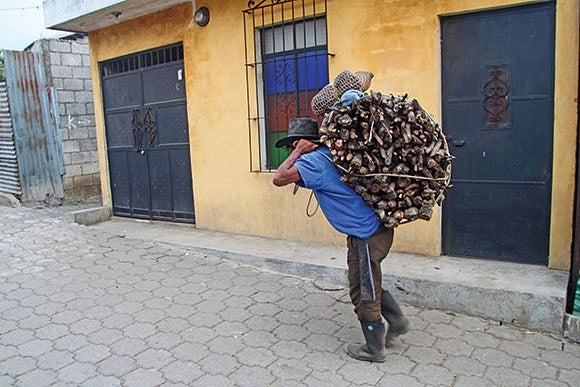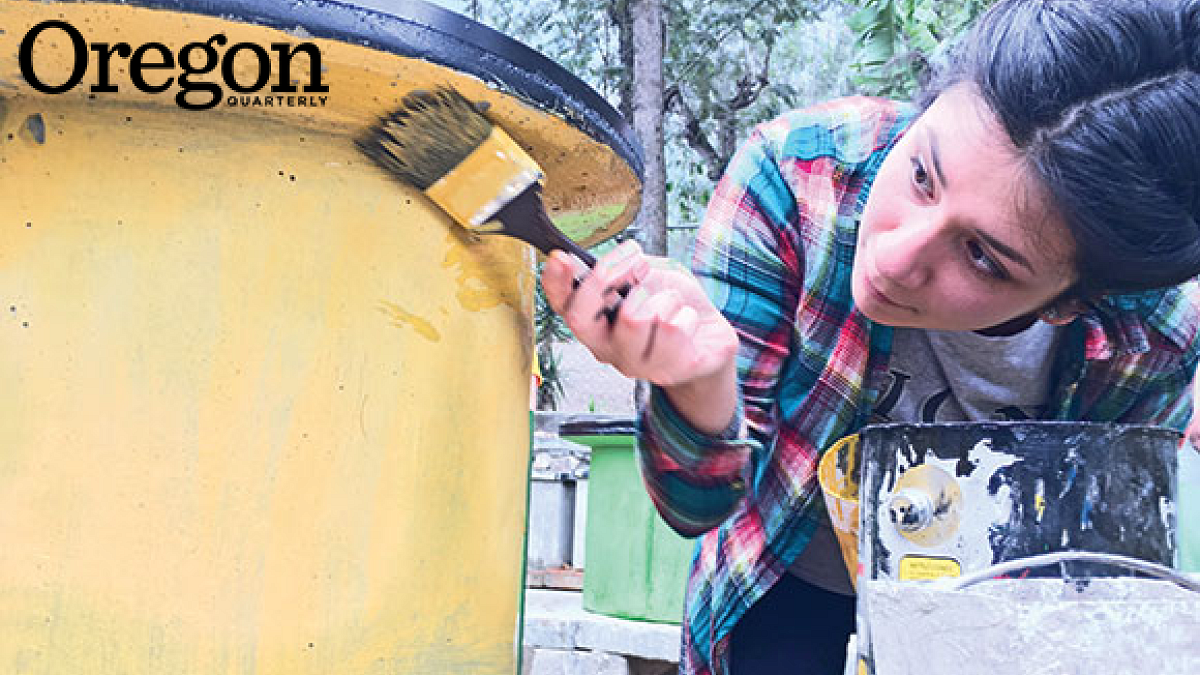Stefani Aleman started her fourth day in Guatemala with serious doubts. The senior biology and psychology major, along with 13 of her UO peers on an alternative spring break, had spent the previous evening asking each other why they were building cooking stoves when other issues, such as poverty, might be more urgent.
Then, the next day, she met Doña Blanca.
Blanca lives in Pastores, a village surrounded by coffee trees and dusty roads. It’s a treacherous climb to her house, up an uneven cement walkway. Aleman’s teammates lugged the 70-pound stove they built the previous day up the walkway to Blanca’s kitchen.
Blanca took one look at the stove and started talking.
Cooking, a seemingly simple and necessary household chore, had caused Blanca’s family great pain and worry. For most of the day, she cooked over an open fire in the home’s small kitchen. Blanca said her ceiling was covered in soot and that she often found it difficult to breathe. Blanca told the students she once spent 15 days in the hospital with respiratory problems.
The open fires give rise to other worries. To fuel the fires, Blanca’s sons, like many people throughout Central America, scour the land for firewood, most of it found on private land and protected by armed guards. Blanca said she lives in fear every time her sons go out searching for firewood. They might not come back.
Blanca's sickness and the fear convinced Aleman, who hopes to work in public health, and her peers that their trip mattered. They weren’t solving poverty, but they were making at least one woman’s life better. In all, the students built and delivered 16 stoves to families in villages around Antigua.
Most college students spend spring break week relaxing, sleeping in, or going on vacation. But this year, Aleman, a graduating senior from Salem, Oregon, and almost 60 other UO students chose another option—completing service projects around the country and the world on one of five “alternative spring breaks,” which are run through the Holden Center for Leadership and Engagement’s Alternative Break Program.
Some of the students assisted at a health clinic in Nicaragua. Others removed invasive mangroves from the coastline in Hawaii. Some explored the transformative power of play with community partner Playworks in Oakland, California. And, closer to campus, a handful of students worked on conservation projects on the Rogue River.

Students on the Guatemala trip teamed up with StoveTeam International, a Eugene-area based nonprofit, to build energy-efficient cookstoves that produce almost no smoke and use less than half the wood of an open fire. They delivered the stoves to families in local communities around Antigua, including Blanca’s.
“Doña Blanca, the matriarch of the family, approached me warmly and began to share her story unprompted,” says Aleman. “She was excited to receive her stove and had received a built extension to her home to accommodate the new stove.”
“As I think about what it meant to be doing the work we were doing and whether it was enough, I look back to this encounter,” says Aleman. “If having an efficient burning stove alleviates health issues to the extent that she is no longer hospitalized for extensive periods of time and that is her expected and wanted outcome, then this work is worth doing.”
Students pay their own expenses for the alternative spring break trip. The program awards $10,000 in scholarships each year, but program director Eric Boggs says he would like more students to have access to the opportunity. “Our alums return with socially responsible leadership in mind and want to make a positive impact on the communities closest to them—their local nonprofits, their residence halls and student clubs, and—more than anything—themselves,” he says. “We want these deep and profound experiences to be available to every engaged student on this campus.”
Aleman first heard of alternative breaks through a friend. The work intrigued her but it was the approach that got her hooked.
“I was immediately pulled in because of the philosophy surrounding alternate breaks: we are here to engage with the community through community-led organizations to create an impact that will continue even when we are no longer there,” Aleman says.
StoveTeam International works with EcoComal, a stove factory in Guatemala owned and operated by Guatemalans. The group says its efforts have improved the lives of more than 430,000 individuals. Along with building and delivering the stoves, the students interviewed recipients, collecting valuable data and hearing powerful stories, which they shared with StoveTeam.
“It’s easy for us to put out numbers on the people impacted by our cookstoves, but to put a human face on it and share their lived experience with dangerous cooking practices is all the more powerful,” says Inara Fernandez, StoveTeam’s volunteer and program coordinator.
Storytelling also provided a context for the students’ work. Students were able to see that what they were doing had an impact. But connecting with village residents took patience. Though she’s a native Spanish speaker, Aleman tried different ways of building trust with stove recipients to get them to talk about the impact of their new stoves. Not all of them opened up as easily as Blanca. Aleman quickly learned how to initiate deeper conversations.
“Something as simple as ‘What is your favorite music?’ or ‘Do you have kids?’ can overcome language barriers and facilitate communication and understanding between two people from two completely different cultures,” she says.
Before she left for Guatemala, Aleman wondered if she would feel comfortable in a new country. She had never traveled outside the US, but she started to notice a shift in her comfort level as the week went on.
“Guatemala is where I felt most comfortable and where I was able to find a greater sense of myself,” says Aleman. “It’s funny to think that I felt more comfortable at the end of the trip in a country that I did not know and in a culture that was unfamiliar than in places that I’ve visited in my own home state.”
Confronting doubt, facing fear, embracing discomfort, and seeking connections to people from another culture turned out to be the trip’s greatest gifts. “I found that being uncomfortable allows for growth and is not necessarily a bad thing,” she says. “It may feel weird at first but it gives you room to challenge yourself—to be comfortable with being uncomfortable.”
—By Molly Blancett, University Communications


